七年级下册英语unit4
- 格式:docx
- 大小:12.28 KB
- 文档页数:4
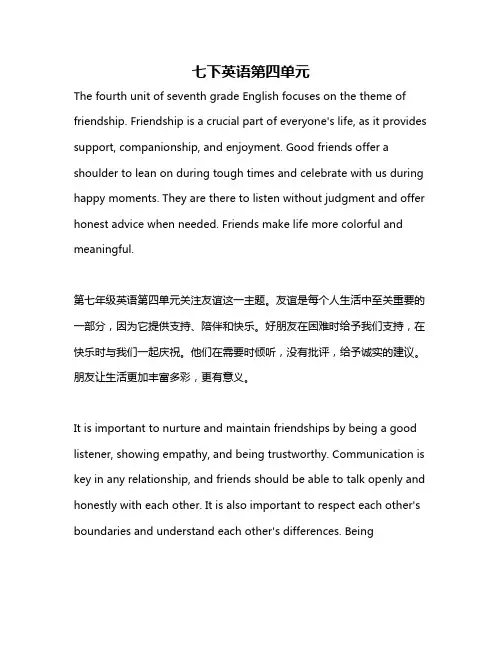
七下英语第四单元The fourth unit of seventh grade English focuses on the theme of friendship. Friendship is a crucial part of everyone's life, as it provides support, companionship, and enjoyment. Good friends offer a shoulder to lean on during tough times and celebrate with us during happy moments. They are there to listen without judgment and offer honest advice when needed. Friends make life more colorful and meaningful.第七年级英语第四单元关注友谊这一主题。
友谊是每个人生活中至关重要的一部分,因为它提供支持、陪伴和快乐。
好朋友在困难时给予我们支持,在快乐时与我们一起庆祝。
他们在需要时倾听,没有批评,给予诚实的建议。
朋友让生活更加丰富多彩,更有意义。
It is important to nurture and maintain friendships by being a good listener, showing empathy, and being trustworthy. Communication is key in any relationship, and friends should be able to talk openly and honestly with each other. It is also important to respect each other's boundaries and understand each other's differences. Beingunderstanding and accepting of your friends' flaws and imperfections is what strengthens the bond of friendship.重要的是通过成为一个好的倾听者、表现出同情心和值得信赖来培养和维护友谊。
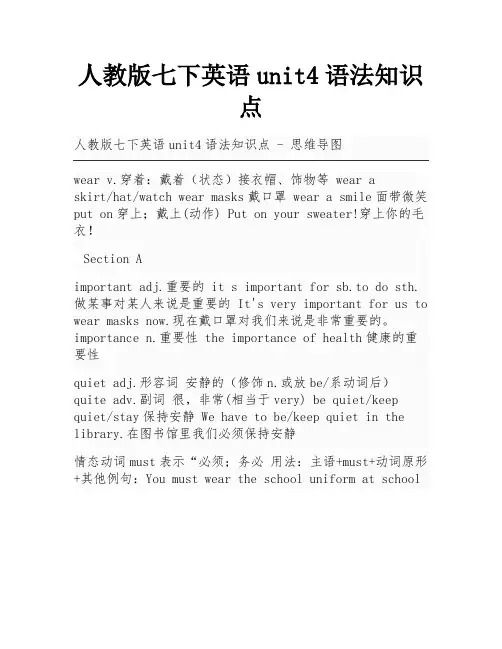
人教版七下英语unit4语法知识
点
wear v.穿着:戴着(状态)接衣帽、饰物等 wear a
skirt/hat/watch wear masks戴口罩 wear a smile面带微笑put on穿上;戴上(动作) Put on your sweater!穿上你的毛衣!
Section A
important adj.重要的 it s important for sb.to do sth.做某事对某人来说是重要的 It's very important for us to wear masks now.现在戴口罩对我们来说是非常重要的。
importance n.重要性 the importance of health健康的重
要性
quiet adj.形容词安静的(修饰n.或放be/系动词后)
quite adv.副词很,非常(相当于very) be quiet/keep quiet/stay保持安静 We have to be/keep quiet in the library.在图书馆里我们必须保持安静
情态动词must表示“必须;务必用法:主语+must+动词原形+其他例句:You must wear the school uniform at school。
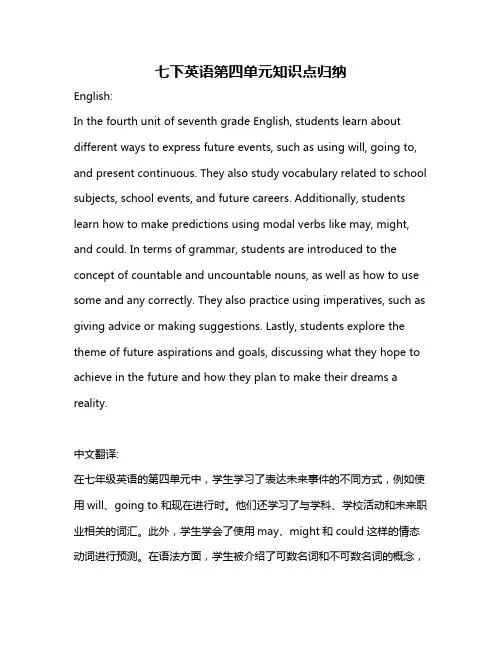
七下英语第四单元知识点归纳English:In the fourth unit of seventh grade English, students learn about different ways to express future events, such as using will, going to, and present continuous. They also study vocabulary related to school subjects, school events, and future careers. Additionally, students learn how to make predictions using modal verbs like may, might, and could. In terms of grammar, students are introduced to the concept of countable and uncountable nouns, as well as how to use some and any correctly. They also practice using imperatives, such as giving advice or making suggestions. Lastly, students explore the theme of future aspirations and goals, discussing what they hope to achieve in the future and how they plan to make their dreams a reality.中文翻译:在七年级英语的第四单元中,学生学习了表达未来事件的不同方式,例如使用will、going to和现在进行时。
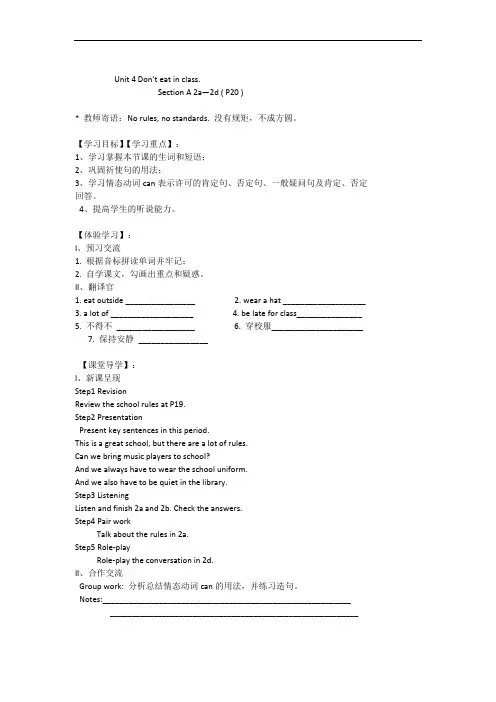
Unit 4 Don’t eat in class.Section A 2a—2d ( P20 )* 教师寄语:No rules, no standards. 没有规矩,不成方圆。
【学习目标】【学习重点】:1、学习掌握本节课的生词和短语;2、巩固祈使句的用法;3、学习情态动词can表示许可的肯定句、否定句、一般疑问句及肯定、否定回答。
4、提高学生的听说能力。
【体验学习】:I、预习交流1. 根据音标拼读单词并牢记;2. 自学课文,勾画出重点和疑惑。
II、翻译官1. eat outside ________________2. wear a hat ___________________3. a lot of ___________________4. be late for class_______________5. 不得不__________________6. 穿校服_____________________7. 保持安静________________【课堂导学】:I、新课呈现Step1 RevisionReview the school rules at P19.Step2 PresentationPresent key sentences in this period.This is a great school, but there are a lot of rules.Can we bring music players to school?And we always have to wear the school uniform.And we also have to be quiet in the library.Step3 ListeningListen and finish 2a and 2b. Check the answers.Step4 Pair workTalk about the rules in 2a.Step5 Role-playRole-play the conversation in 2d.II、合作交流Group work: 分析总结情态动词can的用法,并练习造句。
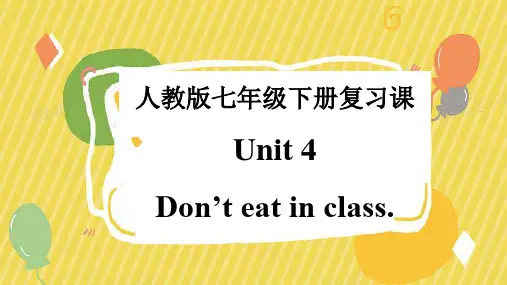
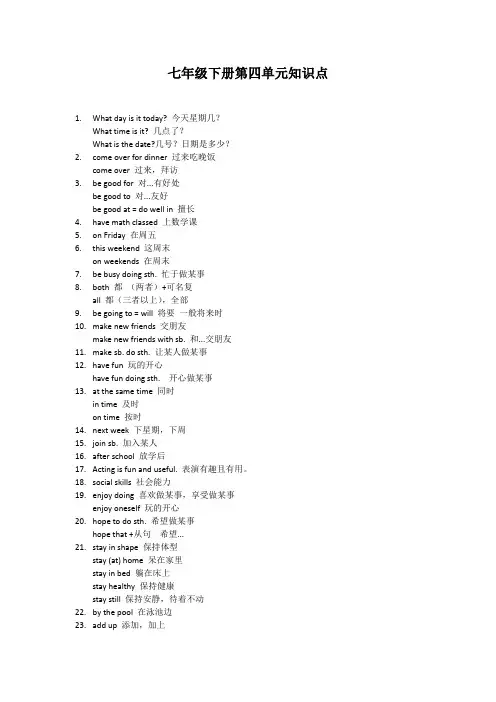
七年级下册第四单元知识点1.What day is it today? 今天星期几?What time is it? 几点了?What is the date?几号?日期是多少?e over for dinner 过来吃晚饭come over 过来,拜访3.be good for 对...有好处be good to 对...友好be good at = do well in 擅长4.have math classed 上数学课5.on Friday 在周五6.this weekend 这周末on weekends 在周末7.be busy doing sth. 忙于做某事8.both 都(两者)+可名复all 都(三者以上),全部9.be going to = will 将要一般将来时10.make new friends 交朋友make new friends with sb. 和...交朋友11.make sb. do sth. 让某人做某事12.have fun 玩的开心have fun doing sth. 开心做某事13.at the same time 同时in time 及时on time 按时14.next week 下星期,下周15.join sb. 加入某人16.after school 放学后17.Acting is fun and useful. 表演有趣且有用。
18.social skills 社会能力19.enjoy doing 喜欢做某事,享受做某事enjoy oneself 玩的开心20.hope to do sth. 希望做某事hope that +从句希望...21.stay in shape 保持体型stay (at) home 呆在家里stay in bed 躺在床上stay healthy 保持健康stay still 保持安静,待着不动22.by the pool 在泳池边23.add up 添加,加上24.find out 找出,查明find 发现,找到(结果)look for 寻找(动作/过程)25.play sports 做运动26.in one’s free time 在某人空闲时间27.exercise one’s mind 锻炼某人的头脑28.be active 积极29.do something active 做一些积极的事something 复合不定代词后+形容词30.play an instrument 弹奏乐器31.on a cold and snowy day 在一个寒冷的有雪的一天on +具体某一天32.listen to music 听音乐33.draw a picture 画画34.read a book 读书35.write a story 写故事36.go on a trip 去旅行37.without 没有(介词prep.)with 有,和,用(介词prep.)38.on the way 在路上on one’s way to sp. 在某人去某地的路上39.例如:for example + 1-2个例子such as +多个例子40.have lunch 吃午餐41.in a hurry 匆忙地hurry up 快点42.make donuts 制作甜甜圈43.How exciting ! 多么令人激动啊!44.surf the Internet 网上冲浪45.help sb. with sth. 在某方面帮助某人with the help of sb. = with one’s help 在某人的帮助下help sb. (to) do sth. 帮助某人做某事help sb. out 帮助某人摆脱困境46.join sb. 加入某人47.would love/like to do sth. 想要做某事Would you like to ...?肯定回答:Yes, I would like/love to.48.talk to sb. on the phone 和某人在电话里交谈49.one pron.一个;num.一代指上文内容:it 同类同物one 同类不同物;同款that 对比结构中,同类e over 过来;顺便来访51.close adj. 接近的,亲近的v.关闭closed adj.关闭的,歇业的be close to 与...接近;与...亲近52.too expensive 太贵的53.need 实义动词:需要need to do sth. 需要做某事need doing sth. 需要被...= need to be done情态动词:需要need do sth.Need ...?回答:54.It‘s three hours away from my house. 距离我家有三个小时。
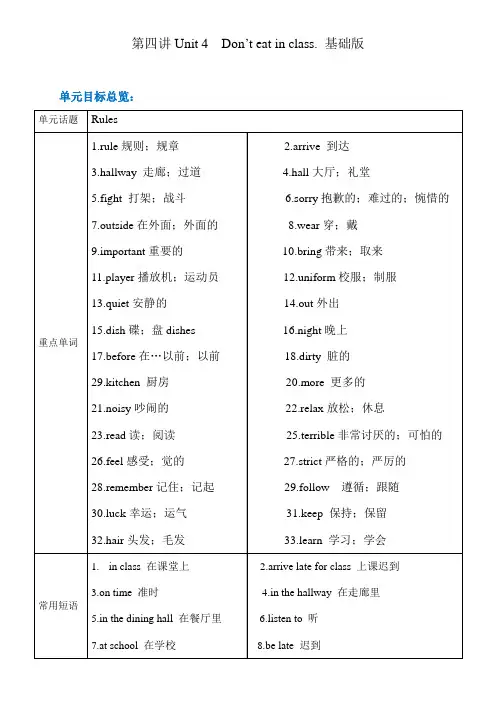
第四讲Unit 4 Don’t eat in class. 基础版单元目标总览:【知识点详解】1、Don’t arrive late for class.上课不要迟到。
1)arrive 意为“到达”。
arrive at+小地点,arrive in +大地点。
◆I will arrive in Beijing next week. 我下周到北京。
◆I arrived at the small village on a cold morning. 在一个寒冷的早晨我到达了那个小村庄。
2)arrive 后面跟地点副词here, there, home时,不需要跟介词。
◆arrive home 到家arrive here 到这儿2、You must be on time.你必须准时。
(1)on time&in timeon time 意为“按时,准时”,指按照规定的时间或者指定的时间做某事;而in time指“及时”,指不迟到或在规定的时间之前或者接近所规定的时间做某事。
◆We must arrive there on time. 我们必须按时到达那里。
At last, the police arrived there in time. 最后警察及时赶到了那里。
(2)must情态动词,意为“必须”,不能单独做谓语,必须和动词原形以其构成谓语;其后接动词原形;其否定形式mustn’t意为“禁止,千万不要”◆I must do my homework before dinner.晚饭前我必须做完作业。
3、Don’t listen to music in class.不要再课堂上听音乐。
(1)listen 是不及物动词,意为“听,倾听”,强调听的动作,后面接宾语时要加上介词to。
◆We should listen to the teacher carefully. 我们应该认真听老师讲课。
◆Listen! Someone is singing in the garden. 听! 有人在花园里唱歌。
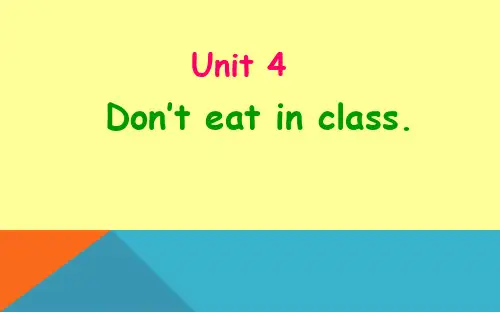
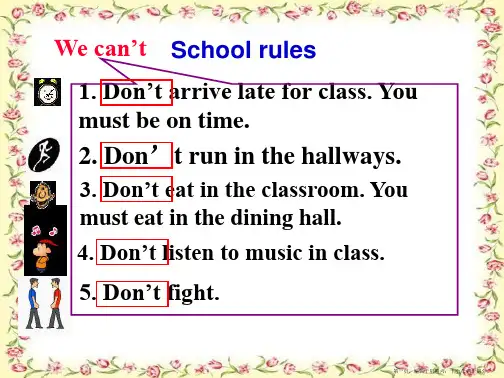
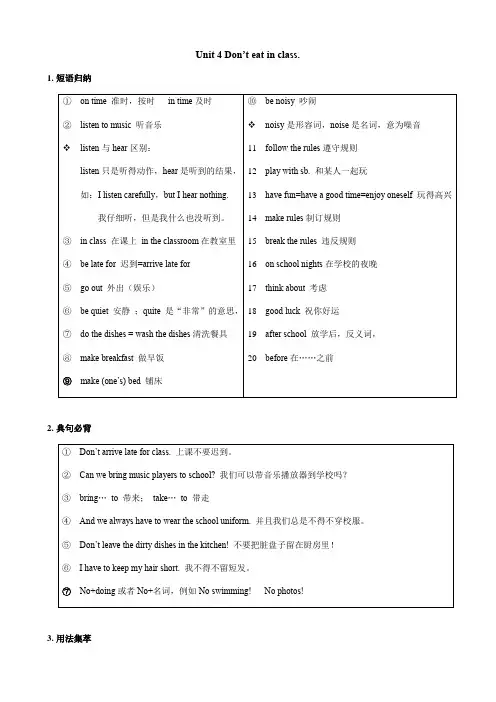
Unit 4 Don’t eat in class.1.短语归纳2.典句必背3.用法集萃(1)Don’t arrive late for class. 不要上课迟到❖arrive in❖arrive at(2)You must be on time. 你必须准时。
❖on time是固定搭配,意为“按时;准时”。
例:Don’t worry. The train will arrive on time. 别担心。
火车会准时到达的。
❖常见的time短语(3)Don’t listen to music in class. 不要上课时听音乐牛刀小试—Do you like the songs by Taylor?一Yes. Country music ______ nice and full of feelings.A. SoundsB.listensC. hearsD. looks(4)This is very important. 这是很重要的❖important作形容词,意为“重要的”。
如:The first lesson is very important. 第一课是很重要的❖反义词:unimportant adj. 不重要的❖派生词:importance n. 重要;重要性(5)Can we bring music players to school? 我们可以把音乐播放器带到学校里来吗?❖bring作动词,意为“带来;拿来”例:Don’t forget to bring your homework here. 不要忘记把你的家庭作业带过来❖辨析bring, take, carry和get牛刀小试Don’t forget _____ your photos here when you come to school.A.bringingB. to takeC. takingD. to bring(6)Oh, and we also have to be quiet in the library. 哦,我们在图书馆里还必须保持安静❖quiet作形容词,意为“安静的”,可以用来修饰人,也可以用来形容地点或场所等。

七年级英语
___________ more and more like spending their holidays in the Hainan Island.
68.他们家很有钱,甚至连他们家的筷子都是用银做成的。
They are very rich. Even their chopsticks _________ __________ __________ silver.
69.她是位心肠很好的女生,例如,昨天她帮一位老太太过马路。
She is a kind-hearted girl. _________ _________, she _______ a granny __________.
70.如果你撒谎,我们就不再是朋友的。
If you _________ __________ life, we _________ ___________ friends any longer.
第三节书面表达(共1小题,满分10分)
树木是人类的好朋友,它为我们付出很多,但是我们却容易忽略这位朋友,经常做出伤害它的事情。
植树节将近,我校举行爱护树木征文大赛。
希望借此呼吁人们爱护树木。
词数:80左右。
要点提示:1.树木对我们很重要。
它提供氧气给我们呼吸,净化我们的空气,吸收空气中有害人体的气体;
2.树木能防止水土流失。
人教版七年级英语下册Unit 4 Don’t eat in class一、重点讲解1.Don’t do sth. 不要做某事,祈使句的否定句。
2.in class上课,in the class在课室。
注意:有the 和没the的区别。
te adj. 迟的、晚的,如:be late, be late for sth;adv.修饰行为动词,放行为动词后, 如:arrive late for, work late,get up late 等。
如:1)I am sorry I am late. 对不起,我迟到了。
2)She is late for class. 她上课迟到了。
4.fight 打架,拓展:fight with sb. 与某人打架5.practice +n/ doing sth. 练习某事/做某事6.get sth for sb. 为某人拿某物,get指“去拿来”7.noisy adj. 嘈杂的;喧闹的拓展:noise n. 噪音; make noise制造噪音8.keep (my)hair short 留短发拓展:keep sth. adj. 使某物保持…(的状态);keep sb. doing… 使某人一直做…二.同步句型&讲解1.What are the rules? We must be on time for class. 规章制度是什么?我们必须按时上课。
讲解:on time按时; in time及时2.We also have to be quiet in the library.而且我们在图书馆必须安静。
讲解:also 也,放在肯定句句中(行前be后)。
3.There are too many rules. 有太多的规章制度。
讲解:too many +可数名词复数:太多4.Don’t leave the dirty dishes in the kitchen.别把脏盘子留在厨房。
七年级是适应中学学习⽣活,适应新的环境,适应新⽼师的讲课⽅式的⼀个环节,对于刚刚从⼩学升上来的学⽣来说很重要。
下⾯是店铺分享的`七年级下册英语单词,欢迎⼤家阅读!Unit4 Don’t eat in class 1、 rule n.规则;规章 2、 arrive v.到达 3、(be) on time 准时 4、hallway n.⾛廊;过道 5、hall n.⼤厅;礼堂 6、dining hall 餐厅 7、listen v.听;倾听 8、listen to… 听…… 9、fight v. &n.打架;战⽃ 10、sorry adj.抱歉的;难过的;惋惜的 11、outside adv在外⾯adj 外⾯的 12、wear v.穿;戴 13、important adj.重要的 14、bring v.带来;取来 15、uniform n.校服;制服 16、quiet adj安静的 17、out adv.外出 18、go out 外出(娱乐) 19、practice v.& n.练习 20、dish n.碟;盘 21、do the dishes 清洗餐具 22、before prep. conj在… 以前 adv以前 23、make (one’s) bed 铺床 24、dirty adj.脏的 25、kitchen n.厨房 26、more adj. pron.更多的 27、noisy adj.吵闹的 28、relax v.放松;休息 29、read v.读;阅读 30、terrible adj.⾮常讨厌的;可怕的 31、feel v.感受;觉的 32、strict adj.严格的;严厉的 33、be strict (with sb) (对某⼈)要求严格 34、remember v.记住;记起 35、follow v.遵循;跟随 36、follow the rules 遵守规则 37、luck n.幸运;运⽓ 38、keep v.保持;保留 39、hair n.头发;⽑发 40、learn v. 学习;学会 Clark 克拉克(姓;男名) Amy 埃⽶(⼥名) Molly 莫莉(⼥名) New York 纽约【七年级下册Unit4英语单词】。
Unit4 Don’t eat in class.Ⅰ. Revision(复习)Ⅱ. Presentation(重点,难点,考点,热点呈现)(1)Unit4重点短语:school rules学校规则arrive late for class 上课迟到be on time准时in the hallways在走廊上listen to听wear a hat戴帽子in class在课堂上at school在学校 a lot of 许多some of一些…be late for…迟到bring … to…把…带来…have to不得不go out出去school uniform校服be quiet安静in the library在图书馆wear a hat戴帽子do one’s homework做家庭作业on school nights在上学日的晚上on school days在上学日do the dishes洗碟子help sb. do sth帮助某人干…too many太多make on e’s bed整理床leave sth. in 把某物留在…at school在学校run to school 跑到学校more rules更多规则on weekends在周末read a book读书go to bed去睡觉make rules定规则follow the rules遵守法则keep my hair short留短发learn to do sth.学习…(2)Unit4重点句型:1. Don’t arrive late for class. 不要上学迟到。
2. You must be on time. 你必须准时。
3. Don’t listen to music in class. 不要在课堂上听音乐。
4. It’s my first day at school. 是我第一天在学校。
5. There are a lot of rules. 有许多规则。
Unit 4 Don’t eat in class.◆短语归纳1. on time 准时,按时2. listen to …听……3. in class 在课上4. be late for 做……迟到5. have to 不得不6. be quiet 安静7. go out 外出8. do the dishes 清洗餐具9. make breakfast 做早饭10. make (one’s) bed 铺床11. be noisy 吵闹12. keep one’s hair short 留短发13. play with sb. 和某人一起玩14. play the piano 弹钢琴15. have fun 玩得高兴16. make rules 制订规则1. Don’t + 动词原形+其他,不要做某事。
2. help sb. (to) do sth. 帮助某人做某事3. too many + 可数名词复数太多的……4. practice doing sth. 练习做某事5. be strict with sb. 对某人要求严格6. be strict in sth. 对某事要要求严格7. leave sth sp. 把某物忘在某地8. keep + 宾语+形容词使……保持某种状态9. learn to do sth. 学会做某事10. have to do sth. 不得不做某事◆典句必背1. Don’t arrive late for class. 上课不要迟到。
2. Can we bring music players to school? 我们可以带音乐播放器到学校吗?3. And we always have to wear the school uniform. 并且我们总是不得不穿校服。
4. There are too many rules! 有太多的规则!5. Don’t leave the dirty dishes in the kitchen! 不要把脏盘子留在厨房里!6. I have to keep my hair short. 我不得不留短发。
人教版七年级英语下册Unit 4优秀作业设计案例一、整体教材分析人教版《Go for it》七年级下册共12个单元,加上复习单元2个,文化背景和学习策略等部分补充材料。
全书采用任务型语言教学模式、融汇话题、交际功能和语言结构,形成一套循序渐近的生活化的学习程序。
每个单元分为A、B两部分,A部分是基本的语言内容,B部分是知识的扩展和综合的语言运用,每个单元还有Self Check部分,供学生自我检测单元所学的语言知识之用。
它采用“语言的输入---学生的消化吸收---学生的语言输出”为主线编排。
通过确定language Goal,采用听说、读、写、自我检测等手段,有效提高语言习得者的学习效率,有利于习得者的语言产出、体现“以学生为主”的思想。
二、教学目标(课时)本单元以“规则”为话题,与学生日常生活密切相关,主要语言功能项目是谈论并制定某些规章制度,如:校规、班规、家规等。
本课时为本单元第三课时,作业设计目标为以下几点:1.能掌握并熟练运用单词out,goout,dish,dothedishes,night,before,dirty,kitchen,m ore,noisy,relax,read,terrible,feel,be strict with, remember, follow, follow the rules, luck;能掌握以下句型:Don’t leave the dirty dishes in the kitchen; I can’t relax either; Imust read a book before I can watch TV; I have to help mom make breakfast.2.通过进行听力练习,让学生们能练习本节课时所出现的新的表达方式;通过进行阅读练习,学生的细节阅读策略能够得到提升。
3.能用英语表达和制定一些简单的规则,理解“没有规矩不成方圆”;无论是在学校时还是在家里以及以后走上社会都应当遵守规则,按规则办事。
Unit 4
◆短语归纳
1. on time 准时,按时
2. listen to …听……
3. in class 在课上
4. be late for 做……迟到
5. have to 不得不
6. be quiet 安静
7. go out 外出 8. do the dishes 清洗餐具
9. make breakfast 做早饭 10. make (one’s) bed 铺床11. be noisy 吵闹 12. keep one’s hair short 留短发
13. play with sb. 和某人一起玩 14. play the piano 弹钢琴15. have fun 玩得高兴 16. make rules 制订规则
◆用法集萃
1. Don’t + 动词原形+其他,不要做某事。
2. help sb. (to) do sth. 帮助某人做某事
3. too many + 可数名词复数太多的……
4. practice doing sth. 练习做某事
5. be strict with sb. 对某人要求严格
6. be strict in sth. 对某事要要求严格
7. leave sth sp. 把某物忘在某地
8. keep + 宾语+形容词使……保持某种状态
9. learn to do sth. 学会做某事
10. have to do sth. 不得不做某事
◆典句必背
1. Don’t arrive late for class. 上课不要迟到。
2. Can we bring music players to school? 我们可以带音乐播放器到学校吗?
3. And we always have to wear the school uniform. 并且我们总是不得不穿校服。
4. There are too many rules! 有太多的规则!
5. Don’t leave the dirty dishes in the kitchen! 不要把脏盘子留在厨房里!
6. I have to keep my hair short. 我不得不留短发。
◆话题写作
Dear Tom,
Thanks for your last letter. You want to know the rules in our school. Now let me tell you about them.
We can’t arrive late for class. We can’t talk loudly in class . We should keep quiet. When we meet our teachers on o ur way, we should say hello to them. We can’t eat or drin k in class, and we can’t listen to music or play games in cl ass.
I think we have too many rules. What about yours? Pleas e write and tell me.
Yours,
Li Ming。